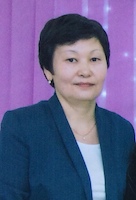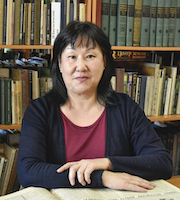A Buddhist manuscript of ‘The hundred-syllable mantra of Vajrasattva’ in Oirat language from the National Museum of Tuva
DOI:
https://doi.org/10.25178/nit.2019.3.15Keywords:
Buddhism; manuscript; Oirat language; hundred-syllable mantra; Vajrasattva; National Museum of the Republic of Tuva; TuvaAbstract
The article introduces (both in transliteration and translation into Russian) the handwritten Buddhist text ‘The hundred-syllable mantra of Vajrasattva’, preserved in the collection of the National Museum of the Republic of Tuva. The text is a part of an Oirat manuscript known as “Ekeyin zürken tarni orošiboi” (‘Hridaya-dharani of Mothers’). It is remarkable in its representation of the famous Buddhist hundred-syllable mantra of Vajrasattva, which has been practiced by Buddhists from ancient times to the present day.
Vajrasattva is a Buddha of Vajrayana, a symbol of purity of Enlightenment (Bodhi) and the Law (Dharma). Reading the sacred hundred-syllable mantra for Buddhists has magical significance: if read one hundred and eight times, it cleans the heavy karma of a person; if pronounced a million times, it gives enlightenment. The hundred-syllable mantra is believed to be above all other mantras, therefore Buddhist lamas say that there is no deeper practice than the ‘The hundred-syllable mantra of Vajrasattva’.
References
Androsov, V. P. (2000) Slovar' indo-tibetskogo i rossiiskogo buddizma: glavnye imena, osnovnye terminy i doktrinal'nye poniatiia [A dictionary of Indo-Tibetan and Russian Buddhism: major names, basic terms and doctrinal concepts]. Moscow. 200 p. (In Russ.).
Bicheldey, U. P. (2011) Sobranie buddiyskikh rukopisey i ksilografov v fondakh Natsional'nogo muzeya Respubliki Tyva kak pamyatniki dukhovnoy kul'tury tuvinskogo naroda [A collection of Buddhist manuscripts and woodcuts in the funds of the National Museum of the Republic of Tuva as monuments of spiritual culture of the Tuvan people]. In: Pamyat' mira: istoriko-dokumental'noe nasledie buddizma [Memory of the world: the historical and documentary heritage of Buddhism]: Proceedings of an international conference / ed. by V. V. Minaev. Moscow, Russian State University for the Humanities. 359 p. Pp. 228–233. (In Russ.).
Gerasimova, K. M. (1989) Traditsionnye verovaniia tibettsev v kul'tovoi sisteme lamaizma [Traditional Tibetan beliefs in the cult system of Lamaism]. Novosibirsk, Nauka. 320 p. (In Russ.).
Zangdok, P. (2014) Teksty praktik traditsii Longchen N'ingtik [Texts of the Longchen Nyingtik Practices]. Moscow, Centr Drikung Kag'ju Ratna Shri. 165 p. (In Russ.).
Muzraeva, D. N. (2019) Iz istorii komplektovaniya i opisaniya Fonda–8 Nauchnogo arhiva KalmNC RAN (po opisi V. O. Polyaeva) [Fond 8 of the Scientific Archive of the Kalmyk Scientific Center (RAS): Excerpts from the History of Its Formation and Description (an Insight into V. O. Polyaev’s Inventory List)]. Oriental Studies, issue 3, pp. 450-459. DOI: 10.22162/2619-0990-2019-43-3-450-459. (In Russ.).
Patrul, R. (2007) Slova moego nesravnennogo Uchitelia / s predisloviem Dalai-lamy i Dilgo Kkhentse Rinpoche [The words of my incomparable Master / with the foreword of the Dalai Lama and Dilgo Khyentse Rinpoche]. St. Petersburg. 607 p. (In Russ.).
Rinchinov, O. S. (2018) Bibliographic Database “Sources in traditional medicine in Tibet languages”. Scientific and Technical Libraries, issue 4, pp. 72-83. DOI: 10.33186/1027-3689-2018-4-72-83 (In Russ.).
Tinlei, D. Osnovy buddiiskoi filosofii. Lektsii prochitany v Respublikanskom institute povysheniia kvalifikatsii rabotnikov obrazovaniia Respubliki Kalmykiia [Fundamentals of Buddhist philosophy. Lectures given at the Republican Institute for Advanced Training of Education Workers of the Republic of Kalmykia] / transl. by M. Malygina. Biblioteka buddiiskikh tekstov. www.geshe.ru [online] Available at: http://geshe.ru/books/GesheDjampaTinley/Geshe Dzhampa Tinlei-Osnovy buddiiskoi filosofii.pdf (access date: 28.02.2019). (In Russ.).
Chzhe, Zonkapa. (2007) Bol'shoe rukovodstvo k etapam puti Probuzhdeniia [The great guide to the stages of the path of Awakening] : in 2 vols. St. Petersburg, A. Terent'ev Publ. Vol. 1. 786 p. (In Russ.).
Sazykin, A. G. (1992). Sobranie mongol'skih rukopisei i ksilografov iz fondov Tuvinskogo respublikanskogo kraevedcheskogo muzeya im. 60 bogatyrei (Kyzyl) [The collection of Mongolian manuscripts and xylographs in the 60 Heroes’ National Museum of Tuva in Kyzyl]. In: Tyurkskie i mongol'skie pis'mennye pamyatniki. Tekstologicheskie i kul'turovedcheskie aspekty issledovaniya [Turkic and Mongolian monuments of writing: Textual and cultural aspects of research]. Ed. by S. G. Kliashtornyi and Iu. A. Petrosian. Moscow, Nauka, Vost. Lit. Publ. 162 p. P. 45–58. (In Russ.).
Sazykin, A. (1996) The Collection of Mongolian Manuscripts and Xylographs in the Ethnological Museum of the Republic of Tuva in Kyzyl. Manuscripta Orientalia, vol. 2, no. 2, pp. 44–49. (In Engl.).
Powers, J. (2007) Introduction to Tibetan Buddism. Ithaca, NY, USA. 591 p.
Published
How to Cite
Mandzhieva B. B. and Sumba R. P. A Buddhist manuscript of ‘The hundred-syllable mantra of Vajrasattva’ in Oirat language from the National Museum of Tuva. The New Research of Tuva. 2019, № 3 [online] Available at: https://nit.tuva.asia/nit/article/view/874 (access date ...). DOI: 10.25178/nit.2019.3.15
Issue
Section

Author(s) license holder(s) grant rights for their work to the journal (grantee of a license) under the simple non-exclusive open license in accordance with Art. 1286.1 «Open license for a research work, work of literature or fine arts», Civil Code of the Russian Federation.
New Research of Tuva publishes articles under the Creative Commons Attribution-NonCommercial license (CC BY-NC).
Since it is an open license, author(s) reserve the right to upload the article to their institutional repository, submit it to another journal (if it allows republications), or republish it on their own website (in full, or in part).
However, several conditions apply here:
a) The republished version must always contain the name(s) and affiliation(s) of the author(s), the original title and the hyperlink to the original version on the New Research of Tuva website;
b) It must be in open access, free of charge, and no category of readers must be in any way whatsoever advantaged over general readership.
c) should the contribution be submitted elsewhere by its author(s) without substantial modification (30% or more of original text unchanged), the body of the article should contain a disclaimer that the original version was published in New Research of Tuva (with a link to the respective page)
The CC-BY-NC is a non-revocable license which applies worldwide and lasts for the duration of the work’s copyright.










